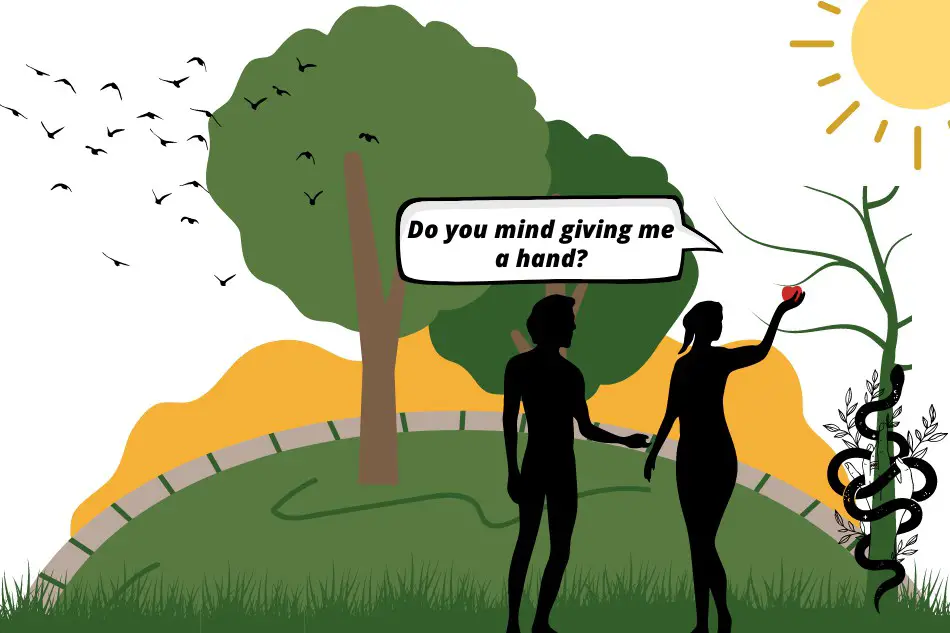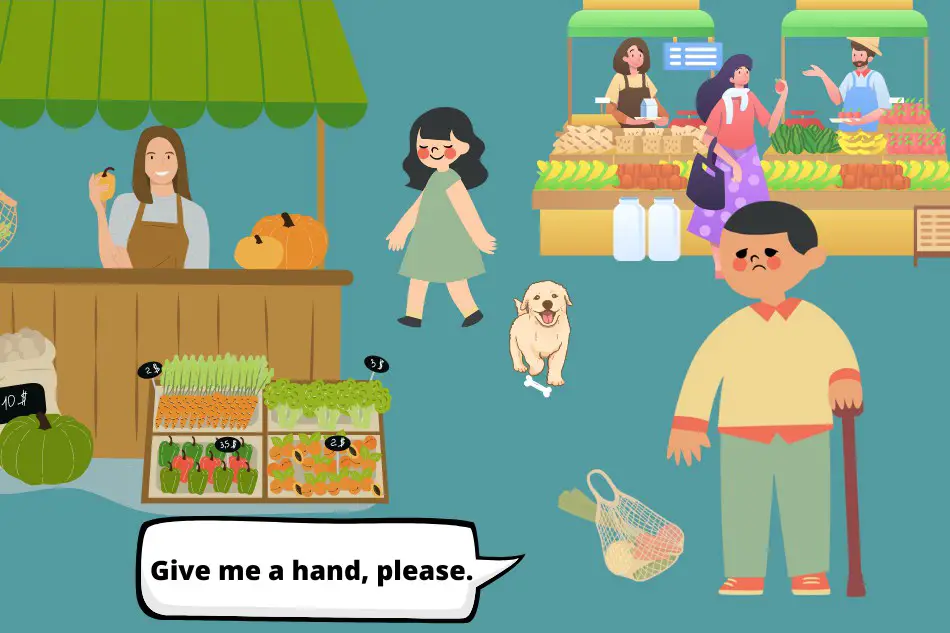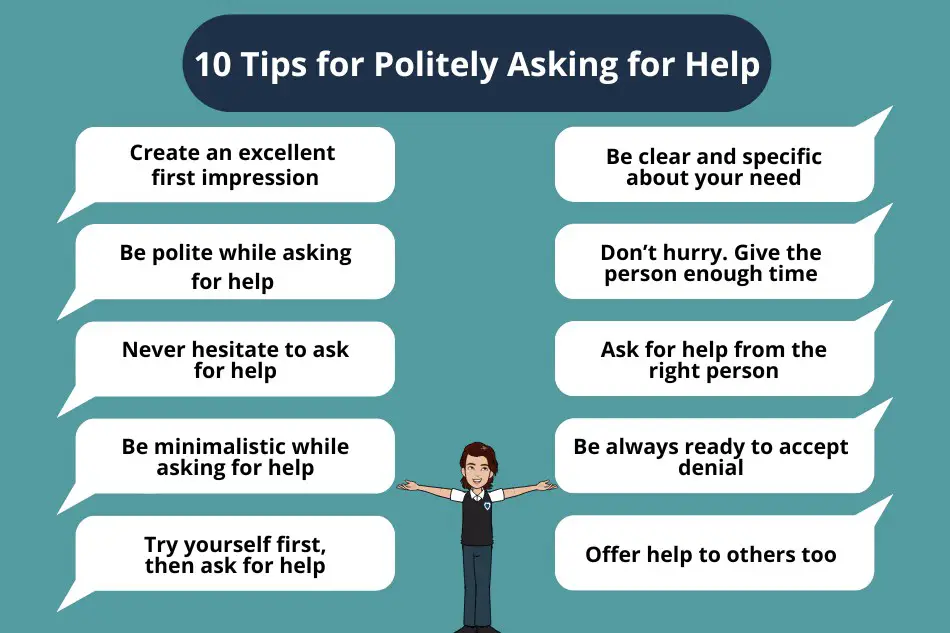Who doesn’t ask for help from others? Everybody does. However, many ESL speakers may find it hard to ask for help in English. When you ask for help from somebody, it means you either make polite requests to them to do something for you or give you something.
Well! If you are wondering how to do it smartly, this post is for you.
“Could you help me please?” and “Would you give me a hand?” are the two most common polite expressions to ask for help. While asking for help, be sure that you are very specific about the help you are asking for and ensure that you are not asking too much.
Are you looking for a book or a guide to help you learn and improve your English? You may try English Made Easy Volume One: A New ESL Approach: Learning English Through Pictures (Amazon Link).
Table of Contents
- Asking for Help in English Using Modal verbs
- Asking for Help in English Using Interrogative Sentences
- Asking for Help in English Using Imperative Sentences
- Asking for Help in English Using Affirmative Sentences
- 10 Tips for Politely Asking for Help
- Sample Conversation: Asking for Help in English
- In Conclusion
- 10 Frequently Asked Questions Related to Asking for Help in English
If you can’t ask for help or a favor from someone just the right way, they may not be willing to help you. You must use proper words or expressions, tone, and body language to get it right.
We can ask for help in different ways. The common way of asking for help from someone is by using modal verbs. You can also do it by using interrogative, imperative, and sometimes some assertive sentences.
Asking for Help in English Using Modal verbs
In general, modal auxiliary verbs are used to make requests and ask for permission politely. When you ask for help from someone, you actually make requests to do something beneficial for you. In this part, let’s see some expressions with modal verbs to make requests for help.
| Modal Verbs | Example Sentences |
| Can (Informal/Semi-formal) | 1. Can you help me? 2. Can you help me with this, please? 3. Can you give me a hand? 4. Can you lend me a hand? 5. Can you help me out? 6. Can you do me a favor? 7. Can I ask for your assistance? 8. Can I possibly bother you by asking for help? |
| Could (Formal) | 1. Could you help me? 2. Could you help me with this, please? 3. Could you give me a hand? 4. Could you lend me a hand? 5. Could you help me out? 6. Could you do me a favor? 7. Could I ask for your assistance? 8. Could I possibly trouble you by asking for your help? 9. Could I bother you when needed? |
| Will (Informal/Semi-formal) | 1. Will you help me? 2. Will you help me with this, please? 3. Will you give me a hand? 4. Will you lend me a hand? 5. Will you help me out? 6. Will I ask for your assistance? 7. Will you do me a favor? 8. Will it be okay if I ask for your help? 9. Will it be alright if I bother your to ask for help? 10. Will you be there to help me? |
| Would (Formal) | 1. Would you help me? 2. Would you help me with this, please? 3. Would you give me a hand? 4. Would you lend me a hand? 5. Would you help me out? 6. Would you do me a favor? 7. Would you mind helping me? 8. Would you mind if I ask for your help? 9. Would it be possible to help me with this? 10. Would I ask for your assistance? 11. Would you be there to help me? 12. Would it be too much trouble for you if I ask for some help? |
| May (Formal) | 1. May I ask for your assistance? 2. May I expect your help? 3. May I call you for help when needed? |
Note: Whenever you ask for help from someone, you are expected to be polite. Whether in a formal or informal situation, you must maintain a polite tone and body language.
Asking for Help in English Using Interrogative Sentences

We use interrogative sentences for different purposes. Though the primary purpose of an interrogative sentence is to ask questions, we also use it to ask for someone’s permission or to ask for help.
You can use modal verbs to form questions to ask for help from someone. In the previous part, I talked about how you can use modal verbs to ask for help. Besides them, the following interrogative expressions can help you to ask for help from someone.
| Question Phrases | Example Sentences |
| Is it…? | 1. Is it ok for you to help me? 2. Is it alright if I ask for your help when needed? 3. Is it fine to ask for help from you? 4. Is it okay to seek help from you? |
| Do you…? | 1. Do you mind helping me? 2. Do you mind giving me a hand? 3. Do you mind lending me a hand? 4. Do you feel like doing me a favor? 5. Do you find it okay to help me? 6. Do you like to help me with this? |
| Are you…? | 1. Are you available to help me with this? 2. Are you free now to help me out? 3. Are you willing to help me? 4. Are you ready to assist me? 5. Are you okay with helping me? |
Asking for Help in English Using Imperative Sentences

We use Imperative sentences to ask someone to do something. We express command, request, proposal, and encouragement with such sentences. The following sentences are some examples of imperative sentences that you can use to ask for help from someone.
- Help me, please.
- Give me a hand, please.
- Do me a favor, please.
- Please help me with this.
- Please allow me to ask for help.
Note: When you request someone to help you, “please” can help you sound politer. Remember! Politeness is the key to a good conversation. Your good choice of words and tone is crucial to properly requesting help. This can help you not get rejected.
Asking for Help in English Using Affirmative Sentences
Though we use affirmative sentences to give neutral statements, we can ask for help with such sentences. Here are examples of such sentences.
- I need your help.
- I want help.
- I need a favor from you.
- I want your assistance.
- I need your helping hand to accomplish this.
- I need some help.
- I would like to ask for your help when needed.
- I would be grateful if you could help me.
- I wonder if you could help me with this.
- I wonder if I could ask for help from you.
Though apparently, such sentences look like affirmatives or statements, they are originally imperatives because the purpose of the sentences is not to give any statement but rather to request someone to ask for help.
10 Tips for Politely Asking for Help

#1 Create an excellent first impression and create an environment where you can share your problems and ask for help. You should take your time and wait for the right moment.
#2 Be polite while asking for help, whether in a formal or informal situation. You must maintain a polite attitude towards everybody regardless of their age and social status. If you are polite, only then you can expect help from others. your right choice of words, appropriate voice tone, and body language are three core things that help you sound polite.
#3 Never hesitate to ask for help from others if you genuinely need it. We are social beings. We live hand in hand. Thus, it’s our moral responsibility to help others. So, there is no shame in asking for help from others.
#4 Be minimalistic while asking for help from someone. For example, while writing an assignment, you can ask for some help or suggestions from your friend, but you must not expect that s/he will write the whole assignment for all. Make sure your asking for help doesn’t cause trouble for the person you are asking for help from.
#5 Never ask for any help with anything you can do yourself. Try yourself first, then go for asking for help.
#6 Be very clear and specific about what kind of help you need. For example, if you need monetary help, be specific about the amount and, if possible, share why you need it. You should convince them with the proper reasons why they should do this favor for you.
#7 Don’t hurry. Give the person enough time to think and make a decision about whether s/he will help you or not. Some people may not instantly or directly say “No” to you. Let them think. Don’t push them too much.
#8 Ask for help from the right person at the right time and place. Before approaching someone, think about whether the person is capable of helping you with this issue or not. If not, think about someone else.
#9 Be always ready to accept denial. As no one is bound to help you, be gentle and polite if you are rejected. Thank them from the core of your heart for just sparing some time to listen to you.
#10 Offer help to others, too, rather than just asking them. If you help someone today, there will be a high possibility of getting help from them tomorrow.
Sample Conversation: Asking for Help in English
Situation: Rachel is new to the city and is trying to find a specific street. She approaches a stranger, Mark, to ask for directions.
Rachel: Excuse me, Mark? I’m sorry to bother you, but I could use some help.
Mark: Of course! What do you need?
Rachel: I’m trying to find Elm Street. I’ve been walking around for a while, and I can’t seem to locate it. Do you know where it is?
Mark: Yes, I do. It’s just two blocks down this road, then take a left. You’ll see a bookstore on the corner—that’s Elm Street.
Rachel: Thank you so much! I really appreciate your help.
Mark: No problem at all, Rachel. If you need further assistance, don’t hesitate to ask someone. People around here are quite friendly.
Rachel: Thanks again! Have a great day!
Mark: You too! Take care.
In Conclusion
As social beings, we cannot even think of passing a single day alone. We need help from others to lead a smooth help. Whether at home or the office, you must seek help from others at different times for different purposes.
The above post can surely help you to ask for help from someone in English.
Thanks for reading!
Keep practicing!
Happy Learning!
10 Frequently Asked Questions Related to Asking for Help in English
1. How do I politely ask for help without sounding demanding?
You can start with phrases like “Excuse me,” “Could you please,” or “I was wondering if you could help.”
2. Is it okay to approach strangers for help?
Generally, yes, but always be mindful of the context and ensure you approach people in safe and public areas.
3. How can I express gratitude after receiving help?
Simple phrases like “Thank you so much,” “I appreciate your assistance,” or “You’ve been a great help” convey gratitude effectively.
4. What if I need more extended or specialized help?
You can clarify by saying, “I’m in a bit of a situation and could use some expert advice. Do you have a moment?”
5. Can I offer something in return for help?
It’s a kind gesture to offer, especially if someone has gone out of their way. Saying, “Can I buy you a coffee as a thank you?” can be a warm gesture.
6. How do I ask for help in a workplace setting?
You can say, “I’m working on this project and encountered a challenge. Could you guide me through this part?”
7. What if I feel shy or embarrassed to ask for help?
Remember, everyone needs help at some point. It’s okay to admit when you don’t know something. Starting with “I’m a bit lost” or “I’m new to this” can ease into the request.
8. How can I ask for help in an emergency situation?
In urgent cases, be direct and clear. Saying “I need immediate assistance!” or “Can someone help, please?” gets attention quickly.
9. How do I ask for help online or in written form?
Start by briefly explaining your situation and then clearly state what assistance you need. Ensure your tone is polite and appreciative.
10. Is it essential to specify the kind of help I need?
Yes, being specific ensures that you get the right assistance and saves time for both you and the helper.






